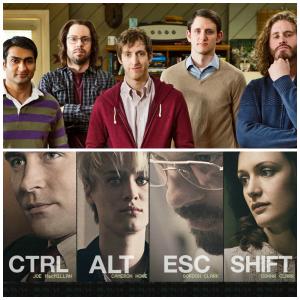Posts By This Author
Computing the Future
Who are the people who understand the jargon and create the technology that defines our new digital age?
“THE COMPUTER’S not the thing. It’s the thing that will get us to the thing,” intones Joe MacMillan (Lee Pace), the enigmatic visionary at the heart of AMC’s new techno-drama Halt and Catch Fire. Set in the early 1980s in Texas’ “Silicon Prairie,” the series chronicles a small, fictional software company that enters the personal computing fray. This is the age of IBM dominance and the improbability of an underdog company taking down the computer Goliath is the premise of the show.
HCF is a kind of origin myth: a drama that tries to capture the spirit and personalities that drove the personal computing revolution that reshaped the world we now inhabit. Across the cable universe, HBO offers another riff on the same theme set in the present day. Silicon Valley is a satirical send-up of startup culture and the boy-men who rule the northern California empire to which we are all in thrall. In tone and style it is the antithesis of the self-consciously serious HCF. But the two shows share a similar preoccupation with exploring the humans who make technology even more than the technology itself.
This is partially a necessity of good storytelling. Nothing slows down a story like having to explain technical expertise. At best you can get a few gags out of the science geek spewing unintelligible jargon to the bewildered “everyperson” (think Sheldon’s whole persona on The Big Bang Theory). But this narrative limitation also hints at the enigma both shows are trying to explore: Who are the people who understand the jargon and create the technology that defines our new digital age? What is the nature of this kind of power?
Apocalypse Redux
Why are blockbuster movies so bad at imagining life after the end of the world?
EVERY SUMMER brings the end of the world. But not since 1998’s Deep Impact and Armageddon both threatened the end of the world with objects from space has there been such apocalypse redundancy in summer blockbusters: This year, class wars, real wars, ecological exhaustion, aliens, and zombie viruses destroyed our planet in as many different ways.
In her excellent e-book The Zombies are Coming!, Kelly J. Baker reminds us that apocalyptic fantasies have been part of the popular American imagination since at least the Puritan hellfire sermon. Even without a common religious narrative to guide them, end-of-the-world stories mostly function as a form of cultural critique and utopian longing. We can only imagine a desired future out of the ashes of the utterly destroyed present. In other words, things are going to have to get a lot worse before they get better.
If Baker is right that we seize on apocalyptic fantasies both to express a deep feeling that something is very wrong with our current state of affairs and to imagine some better alternative, then this summer’s world-ending movies display a profound lack of imagination. Most of them are not even particularly good at conceiving the end of the world, and none of them offer us a vision of how things might be different.
After Earth, for example, is more an overblown coming-of-age story than an apocalyptic thriller. The film follows Kitai (Jaden Smith) as he is guided via walkie-talkie by his wounded father (Will Smith) across an unknown planet. The planet turns out to be Earth 1,000 years after humans have high-tailed it to outer space. But since we never learn why humans had to leave, the apocalyptic frame feels like little more than an excuse to raise the stakes of Kitai’s journey and a chance to show off some fantastic technology. Kitai’s array of super-cool gadgets pretty much guarantees the creatures he meets will have to be more menacing than anything the old Earth could manufacture. The few glimpses we get of humanity’s new planet suggest a post-racial melting pot where everyone speaks a little Chinese and a lot of English and has a preference for flowing linen garments and nautical decoration schemes. I suppose this is a vision of a better tomorrow, but it felt more like a futuristic Pier One ad.
Nothing But the Blood?
What vampires can teach us about consumer capitalism and human desire
IF YOU’VE EVEN casually watched TV in the past five years, seen a movie with coming attractions, driven past billboards and fast food restaurants, or walked into a Barnes & Noble, you can’t avoid the onslaught of vampires in popular culture. As the summer draws to a close, so does the fourth season of HBO’s vampire comedy-drama True Blood. This summer’s vampire big screen attractions—the movie remake of the 1960s vampire soap opera Dark Shadows and the movie adaptation of the young adult novel Abraham Lincoln: Vampire Hunter (it is, improbably, exactly what it sounds like)—have come and gone. The fourth season of CW network’s young adult vampire melodrama The Vampire Diaries begins in September. And the publicity blitz for the final Twilight movie, Breaking Dawn-Part 2, (coming to theaters in mid-November) is about to colonize fast-food merchandise, billboards, and magazine covers.
Ever since John Polidori wrote “The Vampyre” as part of a bet with his good friend Mary Shelley and since Bram Stoker gave us Dracula, the vampire has never exactly gone out of fashion. Vampires are often the horizon on which we project our fears and anxieties, and, like other supernatural fantasy creatures, they help us take stock of our own humanness. If, as Nina Auerbach has argued in her book Our Vampires, Ourselves, we can learn a lot about different epochs of Western culture by the kind of vampires that are in vogue, what do we make of this current crop of blood suckers? What might they teach us about our humanity and our theological response to the world we live in?
If you sink your teeth into these contemporary vampire mythologies, the first thing that is likely to strike you is how attractive these vampires are. In the three vampire mythologies most popular right now, the Twilight series (originally young adult novels, now also movies), The Vampire Diaries (also originally YA fiction from the early 1990s, revived as a TV show in 2009), and True Blood (HBO’s most-watched series, based on adult supernatural romance novels), it is often hard to imagine a good reason why one wouldn’t want to be a vampire oneself. They are super-fast, super-strong, super-sensory beings, who also happen to be astonishingly attractive. And let’s not forget how many amazing skills one could learn—much less all the books one could read, languages one could speak, art one could appreciate—if one lived forever.


